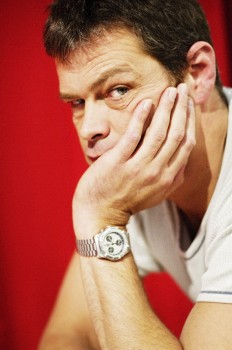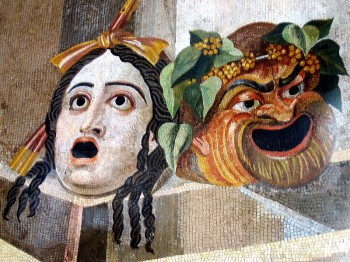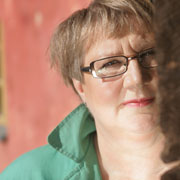Search results for "lola rogers"
On stage in New York
28 May 2010 | In the news
Puhdistus (2007), a play by Sofi Oksanen that also became a award-winning novel (2008), will be produced at the prestigious La MaMa theatre in New York in February 2011 under the title Purge. The director is Zishan Ugurlu, La MaMa’s Artistic Director.
Next month, Purge will be read in Chicago where the conference of the Theatre Communication Group of American professional theatres takes place. In September the play – which is set in 20th-century Estonia – will also be prèmiered in Tartu, Estonia. The novel was published in Estonian translation last year. Purge was published in English this April by Grove/Atlantic, translated by Lola Rogers. So far translation rights have been sold to 28 countries.
The play has been translated into English by Eva Buchwald, dramaturge at the Finnish National Theatre, where Purge was first produced in 2007. No Finnish play has ever before been produced on a professional stage in the US.
Big-city blues
30 September 2005 | Fiction, Prose
Extracts from the novel Beige. Eroottinen kesä Helsingissä (‘Beige. An erotic summer in Helsinki’, Sammakko, 2005). Introduction by Tuva Korsström
Helsinki starts – where? Where a country girl will wear white corduroy pants if she’s eight and her pen pal tells her to. Where you’re allowed to jump in at the public swimming pool, and water splashes in your face no matter what you do, and it’s a long way to the bottom, you can’t touch. Unreal. That’s what Helsinki was like. Buildings that you recognized from pictures. A city where pictures were the starting point of your life, not experience. You step into the picture and begin your life. The step takes a long time. An entire youth. The first few days go well. You’re a tourist. The crowd of anonymous, noisy people is relaxed, you feel uninhibited. Nobody pays any attention to you. Then you start to want to feel. To talk. To say hi to somebody. The waiting begins, and there’s nothing you can do to speed it up. You have to live in the city. Ten years and you’re in, maybe, a little. Be there. Stay. You’ll circulate around the triangle formed by Sokos, Stockmann, and Forum department stores. They’re familiar from pictures, you’re wary of the others. The streetcar home. Home and downtown. The city. The lanes. Conduits. Lights. Trams. Taxis. Buses. The first negro. The first stop at a traffic light. The yellow stone building. The colorful cottages at the foot of the bridge. More…
Timo Parvela: Paten aikakirjat [Pate’s chronicles]
26 February 2015 | Mini reviews, Reviews
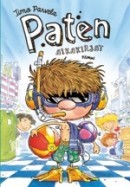 Paten aikakirjat
Paten aikakirjat
[Pate’s chronicles]
Kuvitus [Ill. by]: Pasi Pitkänen
Helsinki: Tammi, 2014. 96 pp., ill.
ISBN 978-951-31-7800-0
€25.90, hardback
Timo Parvela has achieved acclaim and won readers both in Finland and abroad – in Germany in particular. His Maukka ja Väykkä (Purdy and Barker) series of children’s novels will also soon be published in Great Britain. The Ella series for beginning readers now includes no less than 17 books, and now Pate, one of Ella’s supporting characters, has got his own series. The international counterpart of Paten aikakirjat – abundantly illustrated by Pasi Pitkänen – might be someone like Jeff Kinney, illustrator for Diaries of a Wimpy Kid. After living aborad for many years, Pate’s Uncle Pentti makes a bustling entrance into Pate’s life. Timo Parvela delights as usual with his trademark contrasts between children and slightly weird adults. In between comic mishaps are tons of easy-to-read dialogue, comics and lists of silly things.
Translated by Lola Rogers
From the land of abundant reindeer…
17 March 2011 | This 'n' that
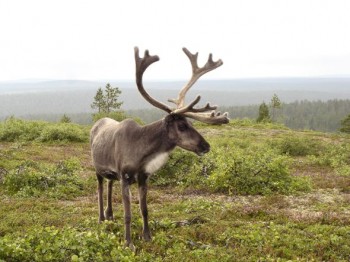
Rangifer tarandus, Finnish Lapland. Photo: Grand-duc (http://en.wikipedia.org/wiki/User:Grand-Duc)
Is Finland, a land of reindeer, ‘dense pine forests and deep snows’ also a ‘quiet literary landscape’?
Not exactly, as we at Books from Finland hope we are demonstrating. And over on the Bookslut website, Bonnie B. Lee comes to the same conclusion, after having mused about the reindeer (yes: in Helsinki you find tasty chunks of them in the freezer boxes of any foodstore) and reading three Finnish novels in English translation.
The novels Lee reviews are Purge by Sofi Oksanen (Puhdistus, 2008, translated by Lola Rogers, published last year), When I forgot by Elina Hirvonen (Että hän muistaisi saman, 2005, translated by Douglas Robinson, published in 2009) and The Year of the Hare by Arto Paasilinna (Jäniksen vuosi, 1975, first published in an English translation by Herbert Lomas in 1995, reprinted as a Penguin edition last year).
We have just entered the Year of the Rabbit, in recognition of which Paasilinna’s book (about a man who rejects his old life and goes roaming the wildernesses with a hare as his only companion) has appeared on the tables of large bookstores in the US. ‘The Year of the Hare is only the most Finnish, and perhaps most antically Zen-ish, of a shelf-load of books that tell us to find and live by our own ideas of contentment,’ said The Wall Street Journal.
The traumatic experiences of war and Finland’s deep forests are the common feature of these novels, Bonnie B. Lee finds. She also opines that ‘melancholy pervades the Finnish psyche’, and that ‘Finland vies with Hungary for highest suicide rate in Europe‘. Oh, but this latter is no longer true: number one on a World Health Organisation suicide rates list is Lithuania, followed by Hungary, Slovenia, Estonia and Latvia – Finland is number six.
Lee is clearly intrigued by her travels in contemporary Finnish literature. ‘The search for identity, a reckoning with a troubled past, and an outsider’s view looking in,’ she comments, ‘are all the stuff of great writing, and Finland is poised to continue to produce poignant and introspective literature that we can appreciate now that English translators have begun the work.’
Poignant and introspective or occasionally funny and fantastical, this is the work we try to offer an early glimpse of, in translation, at Books from Finland. Stay with us!
Maria Turtschaninoff: Maresi. Krönikor från röda klostret [Maresi. Chronicles of the red convent]
6 March 2015 | Mini reviews, Reviews
 Maresi. Krönikor från röda klostret
Maresi. Krönikor från röda klostret
[Maresi. Chronicles of the red convent]
Helsinki: Schildts & Söderströms, 2014. 213 pp.
ISBN 978-951-52-3471-1
€18.90, hardback
Maresi. Punaisen luostarin kronikoita
Suom. [Translated from Swedish into Finnish by]: Marja Kyrö
Helsinki: Tammi, 2014. 213 pp.
ISBN 978-951-31-8000-3
€25.90, hardback
Maria Turtschaninoff (born 1971) has quickly established a place as a leading author of Finland-Swedish young adults’ literature. Her fantasy novel Maresi is set in an old convent run entirely by women. The narrator Maresi is a conscientious girl loved by the congregation of sisters; she is gradually learning of her own special talents and what is expected from her. The peace of the convent is threatened with the arrival of the mute, uncommunicative Jai. Her experience of trauma gradually come to light and the girls work up their collective courage, together with the other women, to challenge the despotism of men. Turtschaninoff is a visual storyteller; her descriptions of nature, convent life, and animal care are indelible. The setting is vividly drawn and the sheltered environment feels well depicted. The novel unflinchingly takes on women’s experiences of physical and psychological violence, and its points of identification transcend all cultural boundaries. This provocative, feminist novel won the 2014 Finlandia Junior prize.
Translated by Lola Rogers
French prize for Sofi Oksanen
26 August 2010 | In the news
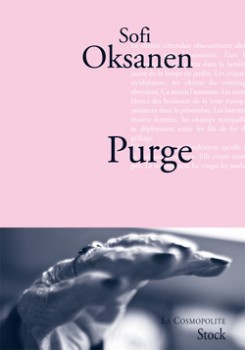 In August the ninth Prix du Roman FNAC was awarded to Sofi Oksanen (born 1977) for her novel Puhdistus (English translation, by Lola Rogers: Purge; see a recent British review [Guardian, August 21] here), to be published in French (by Editions Stock) on August 25 under the title Purge. This is the first time FNAC – the largest bookshop chain in France – has awarded the prize to an author who doesn’t write in French.
In August the ninth Prix du Roman FNAC was awarded to Sofi Oksanen (born 1977) for her novel Puhdistus (English translation, by Lola Rogers: Purge; see a recent British review [Guardian, August 21] here), to be published in French (by Editions Stock) on August 25 under the title Purge. This is the first time FNAC – the largest bookshop chain in France – has awarded the prize to an author who doesn’t write in French.
The jury consists of 900 booksellers and representatives from the general public. They read 300 novels published in France this year, and the winner was chosen out of 30 finalists.
The Finnish production company Solar Films Inc. will transform Puhdistus into a film in 2012: the screenwriter is Marko Leino.
Wo/men at war
9 February 2012 | Essays, Non-fiction
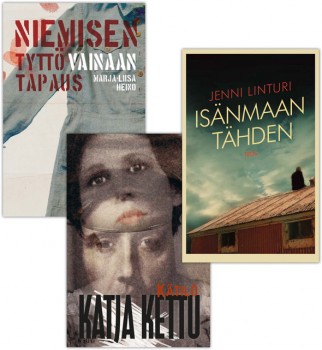 The wars that Finland fought 70 years and a couple of generations ago continue to be a subject of fiction. Last year saw the appearance of three novels set during the years of the Continuation War (1941–44), written by Marja-Liisa Heino, Katja Kettu and Jenni Linturi
The wars that Finland fought 70 years and a couple of generations ago continue to be a subject of fiction. Last year saw the appearance of three novels set during the years of the Continuation War (1941–44), written by Marja-Liisa Heino, Katja Kettu and Jenni Linturi
In reviews of Finnish books published this past autumn, young women writers’ portraits of war were pigeonholed time and again as a ‘category’ of their own. This gendered observation has been a source of annoyance to the writers themselves.
Jenni Linturi, for instance, refused to ruminate on the impact of her sex on her debut novel Isänmaan tähden (‘For the fatherland’, Teos), which describes the war through the Waffen-SS Finnish volunteer units and the men who joined them [1,200 Finnish soldiers were recruited in 1941, and they formed a battalion, Finnische Freiwilligen Battaillon der Waffen-SS].
The work received a well-deserved Finlandia Prize nomination. Tiring of questions from the press about ‘young women and war’, Linturi (born 1979) was moved to speculate that some critics’ praise had been misapplied due to her sex. The situation is an apt reflection of the waves of modern feminism and the reasoning of the so-called third generation of feminists, who reject gender-limited points of view on principle. More…
A slow passion
30 September 2007 | Fiction, Prose
A short story from the collection of short stories Hidas intohimo (‘A slow passion’, Gummerus, 2007)
I don’t want to interfere with it. If something comes of it, then something comes of it. You can’t interfere with time, or fate, or another person. Time ripens things on its own. Fate takes a longer view of things than people do. Like the prophet says, there is a time for every purpose, for my purposes and other people’s.
This garden cottage is a good place to watch everything quietly, a ringside seat for someone who doesn’t want to flail around getting smashed up. The potatoes bloom when it’s time for them to bloom, depending on the length of the summer, the weather, and the time they were planted. Their white and purple flowers are worthy of admiration– potato flowers are flowers, after all. But when the flowers are just opening, it’s not yet time to go digging around among the roots. You have to restrain yourself and wait until the tubers form. You have to wait until they’re finished blooming and the flowers are replaced by plumping green, poisonous berries – though not all potato varieties produce them. But if your fingers are really itching for them, you can poke into the dirt and grope around a little before it’s really time, feel for tubers and remove them carefully, patiently, leaving the plant undisturbed for the smaller ones to grow. If the groping turns up something, you can slip away and savour it, but you still have to wait before you can dig up the whole plant with its rootstock, its beautiful pure tubers heaved up onto the soil, as if Life were offering itself on a silver salver. Then you can have them. They’re ready. But it takes time. Many good things are destroyed by impatience. More…
Drama news
20 May 2010 | In the news
A new internet service aims to provide information about Finnish drama and its writers.
Finnishplays.com is operated by the Finnish Dramatists’ Union, which has entered into partnerships with international drama agents in order to promote Finnish plays.
This year, Finnish plays that are to be performed abroad include Sofi Oksanen’s Purge (Puhdistus; Oksanen’s multi-prize-winning novel (you’ll find a sample from the English translation, by Lola Rogers, through the link) began life as a play at the Finnish National Theatre, appearing in print a year later), Reko Lundán’s Unnecessary people (Tarpeettomia ihmisiä), to be performed in Estonia and in Hong Kong, and Sirkku Peltola’s The Finnhorse (Suomenhevonen), in Iceland.
The website also features a catalogue of plays in translation, plus a search service for Finnish plays in various languages.
Finnish theatre doesn’t travel easily, never has – it’s a long way from here down to European theatre festivals, for example, taking place mostly in the south. But Finnish drama has began to travel more than ever, as new translations of plays into various languages have been made – and they, in turn, have made their way into theatres, in Europe and in the United States.
Johan Leche & Johan Grysselius
The birds and the bees
2 May 2011 | Non-fiction
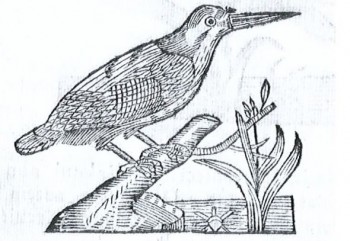
Halcyon or Ispida (kingfisher)? A picture of this mythical bird from a 17th-century thesis, published in Suomen lintutieteen synty

Halcyon or Ispida (kingfisher)? A picture of this mythical bird from a 17th-century thesis, published in Suomen lintutieteen synty
The famous Swedish scientist Carl von Linné claimed in his doctoral thesis in 1757 that swallows spend their winters underwater.
Two of Linné’s countrymen, working at Åbo Academy in Finland, proved him wrong seven years later by giving evidence of migration, but to no avail: the silly theory prevailed until the 19th century.
In these extracts doctors Leche and Grysselius eloquently present a ‘Well-Intended Reader’ with errors of humanity that become epidemic
Extracts from ‘An Academic Treatise on The Wintering and Migration of Swallows’ by Johan Leche & Johan Grysselius (1764), published in Finnish (translated from Latin by Sari Kivistö) in Suomen lintutieteen synty. Turun Akatemian aika (‘The birth of the Finnish ornithology. The era of the Åbo Akademi’, Faros, 2009), edited by Esa Lehikoinen, Risto Lemmetyinen, Timo Vuorisalo & Sari Kivistö
Preface
As we know, humanity is no less inclined to err in matters pertaining to nature than in matters of morals. With regards to errors concerning the natural world, even the most experienced scholars are not always immune. The common people, for their part, have not learned to avoid such pitfalls and are thus constantly bumping into them. This is no wonder, since they are not accustomed to using the help of natural science or mathematics, and are thus unable to perform appropriate tests, to correctly assess future eventualities, or to observe phenomena closely unless they concern something already familiar to them. More…
Digital dreams
4 February 2009 | Essays, Non-fiction
In this specially commissioned article, the first for the new Books from Finland website, Leena Krohn contemplates the internet and the invisible limits of literature.
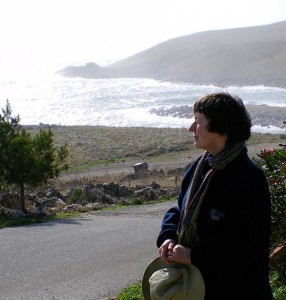
Leena Krohn on the way to Cape Tainaron, Southern Peloponnese, Greece; this is where Europe ends. Her novel entitled Tainaron appeared in 1985. – Photo: Mikael Böök (2008)
The world wide web, whose services most of us now use for work or entertainment, is a greater invention than we have, perhaps, realised up till now: according to the writer Leena Krohn, it is nothing less than an evolutionary leap
Technology combats the limitations of our senses, geography, and time. The human eye can’t compete with the visual acuity of an eagle, or even a cat, but with the best telescopes it can see into the early history of the universe, with new electron microscopes it can distinguish individual atoms.
The human senses nevertheless have an unbelievably broad bandwidth. About a million times more data flows to our brains by means of our senses than we could ever grasp consciously. More…
Remains healthy
13 April 2011 | Non-fiction
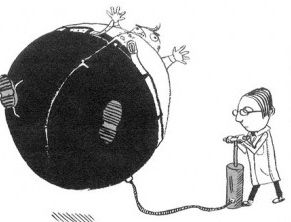
Case note: patient has coronary artery disease for which he was given a balloon. Illustration: Elina Warsta
In these samples from a collection of patient reports, Molemmista päistä tähystetty: päättömiä potilaskertomuksia (‘Examined at both ends: brainless patient reports’, Otava, 2011), human disorders appear bizarre, puzzling or just plain funny in case notes as dictation or transcription occasionally proves erratic
The patient was given instructions for his bowels.
Recommend milder aerobics, ie swimming on an exercise bicycle.
Patient is a healthy 70-year-old girl.
And a mental health evaluation is recommended for the designer of this form. More…
The show must go on
30 June 2007 | Archives online, Fiction, Prose
Extracts from the novel Piru, kreivi, noita ja näyttelijä (‘The devil, the count, the witch and the actor’, Gummerus, 2007). Introduction by Anna-Leena Ekroos
‘I hereby humbly introduce the maiden Valpuri, who has graciously consented to join our troupe,’ Henrik said.
A slight girl thrust herself among us and smiled.
‘What can we do with a somebody like her in the group? A slovenly wench, as you see. She can hardly know what acting is,’ Anna-Margareta snapped angrily.
‘What is acting?’ Valpuri asked.
Henrik explained that acting was every kind of amusing trick done to make people enjoy themselves. I added that the purpose of theatre was to show how the world worked, to allow the audience to examine human lives as if in a mirror. Moreover, it taught the audience about civilised behavior, emotional life, and elegant speech. Ericus thought that the deepest essence of theatre was to give visible incarnation to thoughts and feelings. None of us understood what he meant by this, but we nodded enthusiastically. Anna-Margareta insisted that, say what you will, in the end acting was a childish game. Actors were being something they were not, just like children pretending to be little pigs or baby goats. More…


